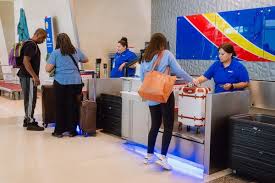Southwest Airlines made waves in the aviation industry with the recent announcement of its plans to cut around 1,750 jobs, marking the first significant round of layoffs in the airline's 53-year history. The decision, aimed at streamlining operations and reducing costs, is expected to primarily impact corporate positions, which accounts for approximately 15% of the workforce. These changes come as part of the company's efforts to transform into a more efficient and agile organization.
CEO of Southwest Airlines, Bob Jordan, described the move as "unprecedented" and emphasized the challenging nature of the decision. In a statement, he stated, "We are at a pivotal moment as we transform Southwest Airlines into a leaner, faster, and more agile organization." The layoffs, including 11 senior leaders holding titles of vice president or higher, are set to be executed by the end of June this year.
The job cuts are projected to result in cost savings of about $210 million in the current calendar year and an additional $300 million in the following year for Southwest Airlines. However, it is important to note that these figures exclude the one-time costs of $60 to $80 million required to cover severance and other benefits for the affected employees.
Southwest Airlines faced pressure from activist investor Elliott Management last year, leading to discussions of broader changes within the organization. As part of a strategic response to these pressures, Bob Jordan outlined a three-year plan which included revamping certain operational aspects, such as moving away from the traditional open seating model in favor of assigned seats, offering seats with extra legroom, and introducing red-eye flights to maximize aircraft utilization.
While Southwest Airlines experienced its first loss in 2020 due to the impact of the Covid-19 pandemic on the airline industry, it has since rebounded with profitable results. Maintaining a remarkable 47-year streak of annual profits prior to 2020, the airline stands out as the only one among the top four largest U.S. carriers to have never filed for bankruptcy protection. Despite this, Southwest has faced challenges with rising costs compared to some of its competitors.
Known for its exceptional customer service and high customer satisfaction ratings, Southwest Airlines holds a prominent position in the U.S. aviation market. With a focus on domestic routes and a reputation for providing a pleasant flying experience, the airline continues to attract and retain a loyal customer base. Moreover, Southwest has demonstrated resilience and adaptability in the face of industry challenges, positioning itself as a key player in the competitive aviation landscape.
As Southwest Airlines navigates these changes and restructuring efforts, the industry and stakeholders will be closely watching to see how the company evolves and adapts in the ever-changing aviation sector. The airline's ability to successfully implement these strategic changes while maintaining its core values and customer-centric approach will likely play a crucial role in shaping its future trajectory within the highly competitive airline industry.

